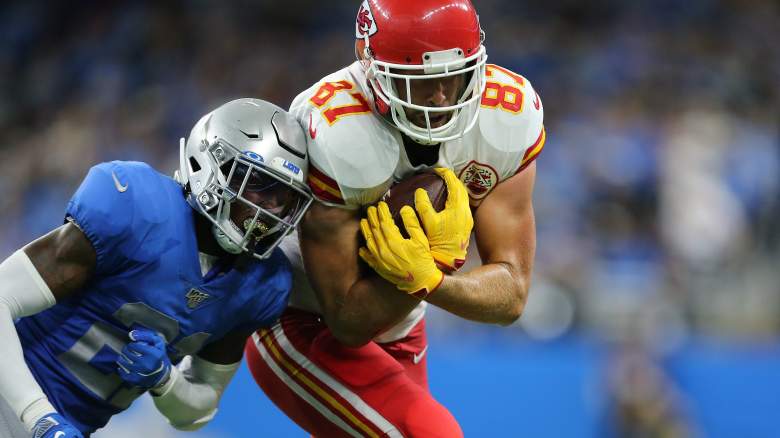
Getty Tracy Walker lays a hit on Travis Kelce.
The Detroit Lions suffered from plenty of notable blown calls late against the Green Bay Packers, but one call that went unnoticed happened early in the game and proved just as costly to the team in the end.
When Tracy Walker went for an interception, he collided helmets with Geronimo Allison. The play looked violent in real time, which is the reason Clete Blakeman and crew threw a flag. But upon review, the helmet contact levied by Walker, Detroit’s safety, was merely incidental.
As Rich Madrid of Football Zebras wrote, there was no reason for a flag to be thrown on the play considering the position of the bodies and the intent of Walker. He was merely trying to make a play for the football in the moment instead of deliberately blow up Allison.
Here’s what Madrid wrote on the penalty:
“But there should not have been a penalty for unnecessary roughness or a hit on a defenseless player or helmet-to-helmet and there is nothing precluding the officials from conferencing after the flag and picking it up. There was helmet-to-helmet contact but it was incidental to the play. Walker did not lead with his head and was not going for a hit on the receiver, electing instead to intercept or break up the pass. Walker can even be seen attempting to turn his head to the side to avoid the helmet-to-helmet contact.”
Blakeman disagreed, and even explained in the postgame pool report that he felt as if the contact was helmet to helmet regardless of if Walker was going for the ball, citing the violent nature of the play and strict liability.
Strict Definition
The problem with that? The definition of the rule. As Madrid also explains, there wasn’t much Walker could do to miss the hit, especially with how the play happened, but yet the referees enforced the strongest interpretation of the rule and didn’t exactly back down from that assessment.
Here’s what he wrote:
“Strict liability” applies to crackback blocks, hits on defenseless players, and roughing the passer. In the context of NFL rules, strict liability means that “A player who initiates contact against such an opponent is responsible for avoiding an illegal act” (Rule 12-1-3). None of those were what happened on this play.
His comments leave little room for possible flag pick-up and determination that the contact was incidental to the defender going for the interception. The defender’s body language and angle suggest as much, even as a last split second decision. The league operates under the mantra “when in doubt, flag it” but that does not preclude them from taking the time to discuss the mechanics of the hit, especially during the injury timeout. This is not subject to replay review.”
The bottom line is the Lions were cost 15 yards on the play. Quickly, the Packers marched down the field and were able to drill a field goal just before halftime to tie the game 13-13. Take those points off the board and it could be a different ballgame in the end. It was a close game, and three points ended up mattering a ton.
While the play may have looked violent in real time, there was a better case for it not being flagged at all in the end.
Fans Can’t Move On
Perhaps the biggest reason for the frustration was more the illegal hands to the face calls from later in the game. Regardless, there were other calls in the game which played a huge role and this was yet another one to remember which may be overlooked in the end.
Detroit fans have shown their frustration in a big way, even taking billboards out that depict the referees as Packers fans. While it might be funny to some, to many fans, it’s frustratingly serious.
This is yet another instance in which Blakeman’s crew may have made a costly error.
READ NEXT: Lions Week 7 Referee Crew Revealed
